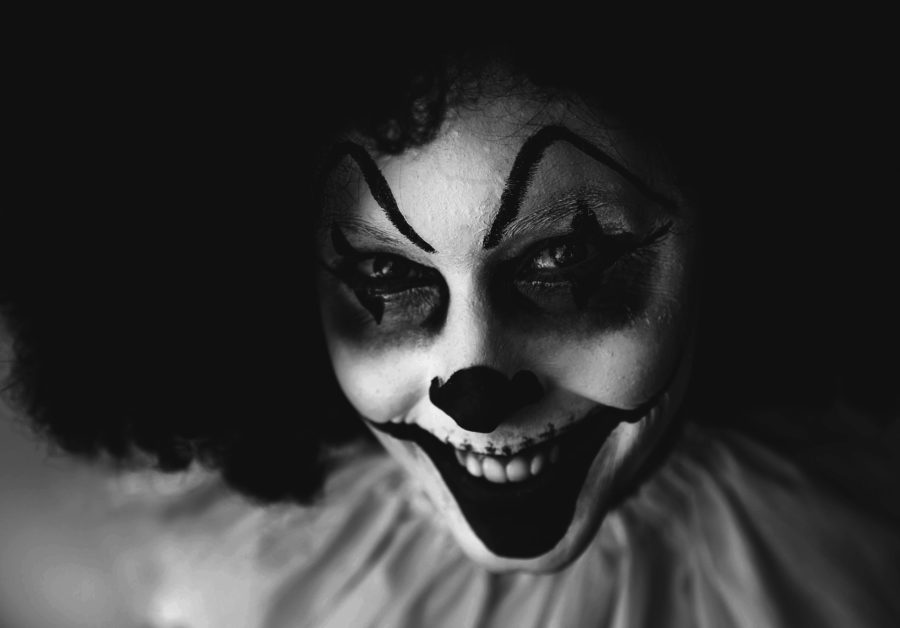Creepy Clowns on Campus
Oct 10, 2016
The “clown epidemic” has spread like wildfire across the nation.
People dressed as clowns have been spotted strolling along roadsides, cornfields, local businesses and even on UNI’s own campus.
According to The Guardian, the clown craze supposedly all started in Greenville, South Carolina, where a little boy spotted two clowns in the woods near his home in early August. The sightings have increased to hundreds in just two months.
Most sightings are reported as harmless and innocent, but numerous have involved kidnappings, theft or other forms of violence. The phenomenon has caused many people to feel uncomfortable, and especially made UNI students squirm when cases reports of clowns occurred in their own backyard.
Freshman biology major Taylor Gruber shared her clown-sighting story.
Last Tuesday night, Gruber decided to poke fun at her clown-fearing friends and go “clown hunting” around campus. She admitted that she wasn’t expecting to find any clowns, that is, until one began to chase her around campus at around 1 a.m.
“I was going to go by the campanile and go towards my dorm but I noticed someone coming towards me at a very fast- paced walk,” Gruber said. “I saw wild hair flying around in the wind, so I panicked and took off running towards Bartlett Hall.”
After assuring herself that the clown was gone, she made her way back to the campanile, only to find a clown mask lying on the ground. Gruber said that she was alone and terrified by the situation. She decided to grab the mask so nobody else would be freaked out by it, and turned it into her RA.
Gruber doesn’t think students should be afraid or question their safety on campus and that the people participating in this clown epidemic are likely a bunch of college kids pulling pranks on each other. She did, however, mention that if students are concerned about walking alone at night, they should find a buddy to walk with, or to carry an extra form of self-defense protection.
UNI Public Safety did not return the Northern Iowan’s request for comment.
Sophomore Spanish major Connor Lang also spotted a pair of clowns on campus. He said they were on top of the big University of Northern Iowa sign and swinging their legs back and forth. He said that it was very surreal and creepy to hear about all the clown sightings on social media, then actually see some in the flesh.
Although clown sightings are taking center stage right now, Lang thinks that the fad will come and go in no time.
“I think most of the clown ‘sightings’ are just tricksters trying to get a ruse out of people,” Lang said. “I think it will die out as quick as just about any other social media craze.”
One of the popular rumors circling around campus in regards to clown sightings was that a clown was actually spotted in one of the residence halls. Allegedly, a resident in Noehren Hall spotted a clown in the building, then immediately reported it to the RAs who then put the building on lockdown.
According to a Noehren Hall Resident Assistant, Crystal McEntire, this rumor was more than untrue. McEntire shared that yes, a student did approach an RA saying that they spotted a clown in the building, but when the RAs completed rounds in the building, there was no trace of any funny clown business.
“I’m not even sure if there actually was a clown because no RAs [could confirm a sighting],” McEntire said.
Another question that has been raised is whether it would be a good idea for students to still dress up as clowns for Halloween. Lang shared that he thinks the clown costume is going to rise in popularity this year when Halloween rolls around because of the phenomenon, but he’s not certain if it’s such a good idea to dress up as one.
“Although it would be ironic and funny to dress as a clown for Halloween, a lot of people are genuinely[…] creeped out by clowns right now,” Lang said. “I would hate for somebody dressed as a clown to get hurt because somebody else negatively reacted to their costume and found them too scary or unsafe.”








